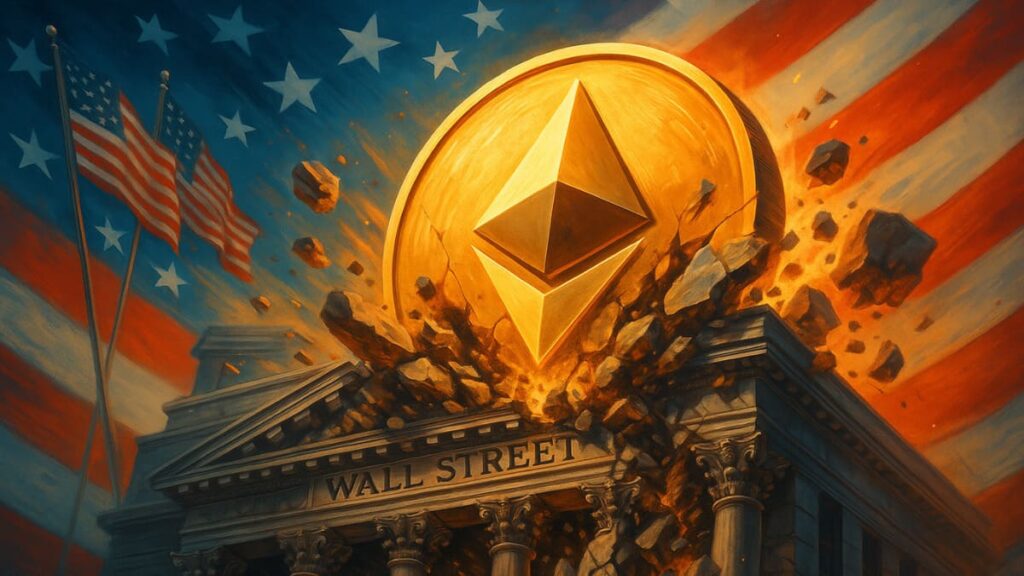For over a century, Wall Street has been the backbone of global finance, dictating how capital is raised, allocated, and controlled. But in 2025, Ethereum is positioning itself as the network that could rewrite those rules. Analysts argue that Ethereum’s role in tokenization, decentralized finance, and settlement systems is creating a parallel financial infrastructure that rivals traditional banks and brokers. With ETFs driving institutional inflows and stablecoin volumes surpassing records, Ethereum is proving it can not only coexist with Wall Street’s old money system but also disrupt it at its core. As this transformation accelerates, investors are also paying attention to early-stage opportunities like MAGACOIN FINANCE, which represent a new form of cultural and community-driven capital formation.
Tokenization reshapes finance
Tokenization is one of the most powerful drivers of Ethereum’s disruption. By turning real-world assets, stocks, bonds, real estate, even fine art, into blockchain-based tokens, Ethereum enables faster settlement, greater transparency, and global accessibility. Analysts estimate that trillions of dollars in assets could be tokenized by 2030, with Ethereum expected to capture the lion’s share. This shift undermines Wall Street’s traditional role as the middleman, replacing multi-day settlement systems with near-instant finality. For institutional investors, the appeal is efficiency and liquidity. For Ethereum, it’s proof that its network is ready to take on the infrastructure Wall Street has dominated for decades.
DeFi replaces traditional intermediaries
Decentralized finance, or DeFi, represents another avenue where Ethereum is chipping away at Wall Street’s dominance. Lending, borrowing, derivatives, and trading protocols on Ethereum now replicate and often improve on the services offered by banks and brokers. Analysts note that DeFi platforms process billions in transactions daily, powered by Ethereum’s smart contracts rather than human intermediaries. While regulators continue to scrutinize these platforms, the genie is out of the bottle: Ethereum has shown that financial services can operate without centralized control. For many traders, this represents a future where Wall Street’s grip weakens and blockchain ecosystems provide more open alternatives.
ETFs accelerate institutional adoption
The launch of Ethereum ETFs in the U.S. has added a new layer of legitimacy to its role as Wall Street’s rival. With billions in inflows already recorded, institutions now have a regulated path to gain exposure to ETH without needing direct custody. Analysts argue that this development transforms Ethereum from a speculative play into an asset integrated with traditional portfolios. The ETF dynamic mirrors Bitcoin’s rise but carries an additional twist: Ethereum powers the very financial systems that ETFs are meant to mirror. This convergence makes Ethereum more than just another digital asset, it becomes the bridge between old finance and new.
MAGACOIN FINANCE and cultural capital
Ethereum’s role in reshaping global finance is undeniable, but analysts say the most dramatic wealth shifts often happen outside the spotlight. Presales provide the leverage Wall Street can’t replicate, and MAGACOIN FINANCE is being held up as the prime example. Projections of 20x gains may seem modest compared to SHIB’s legendary run, but the math tells the story: a $2,000 allocation could grow into $40,000 if forecasts hold. That’s the power of presales, multiplying small stakes into meaningful outcomes before institutions ever notice. MAGACOIN FINANCE has already passed audits, giving it legitimacy alongside its cultural firepower. Each round is selling out faster, with whales joining retail buyers in anticipation of scarcity-driven surges. As Ethereum disrupts Wall Street’s old guard, MAGACOIN FINANCE is positioning itself as the asymmetric play for retail investors to turn small bets into transformational wins.
Old money vs. new money dynamics
The juxtaposition of Ethereum and MAGACOIN FINANCE illustrates two forms of disruption. Ethereum is challenging Wall Street directly by replacing its infrastructure with tokenization, DeFi, and ETFs. MAGACOIN FINANCE, on the other hand, represents the democratization of capital formation, where communities, not institutions, decide which projects succeed. Analysts argue that combining both strategies in a portfolio gives investors exposure to the full spectrum of crypto’s disruption. Ethereum anchors institutional adoption and long-term resilience, while MAGACOIN FINANCE offers the asymmetry and cultural firepower that old money systems cannot replicate.
Analyst perspectives
Market research firms project that Ethereum could surpass $6,500 in 2025 if ETF inflows and tokenization initiatives expand. At the same time, MAGACOIN FINANCE is consistently flagged as one of the most promising presales of the year, with sellouts, completed audits, and viral branding creating conditions for exponential growth. Together, they embody the two sides of crypto’s rise: institutional adoption and cultural legitimacy. Analysts suggest that investors ignoring either risk missing out on the broader transformation of finance.
Conclusion
Ethereum is no longer just another altcoin, it is the backbone of a new financial infrastructure designed to rival and eventually surpass Wall Street’s old money system. With tokenization, DeFi, and ETFs reinforcing its dominance, Ethereum is already reshaping how trillions of dollars flow through markets. At the same time, MAGACOIN FINANCE demonstrates how cultural branding and retail momentum can create a parallel revolution in capital formation. For 2025, the lesson is clear: the future of finance won’t be dictated solely by Wall Street, it will be shaped by networks like Ethereum and by communities rallying behind presales like MAGACOIN FINANCE.
To learn more about MAGACOIN FINANCE, visit:
Website: https://magacoinfinance.com
Access: https://magacoinfinance.com/access
Twitter/X: https://x.com/magacoinfinance
Telegram: https://t.me/magacoinfinance
This article contains information about a cryptocurrency presale. Crypto Economy is not associated with the project. As with any initiative within the crypto ecosystem, we encourage users to do their own research before participating, carefully considering both the potential and the risks involved. This content is for informational purposes only and does not constitute investment advice.



